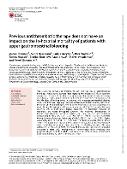Previous antithrombotic therapy does not have an impact on the in-hospital mortality of patients with upper gastrointestinal bleeding

Autor
Hozman, Marek
Hassouna, Sabri
Datum vydání
2023Publikováno v
European Heart Journal: SupplementsRočník / Číslo vydání
25 (Suppl. E)ISBN / ISSN
ISSN: 1520-765XInformace o financování
MSM//LX22NPO5104
UK/COOP/COOP
Metadata
Zobrazit celý záznamKolekce
Tato publikace má vydavatelskou verzi s DOI 10.1093/eurheartjsupp/suad103
Abstrakt
The association between antithrombotics (ATs) and the risk of gastrointestinal bleeding is well known; however, data regarding the influence of ATs on outcomes are scarce. The goals of this study are: (i) to assess the impact of prior AT therapy on in-hospital and 6-month outcomes and (ii) to determine the re-initiation rate of the ATs after a bleeding event. All patients with upper gastrointestinal bleeding (UGB) who underwent urgent gastroscopy in three centres from 1 January 2019 to 31 December 2019 were retrospectively analysed. Propensity score matching (PSM) was used. Among 333 patients [60% males, mean age 69.2 (+-17.3) years], 44% were receiving ATs. In multivariate logistic regression, no association between AT treatment and worse in-hospital outcomes was observed. Development of haemorrhagic shock led to worse survival [odds ratio (OR) 4.4, 95% confidence interval (CI) 1.9-10.2, P < 0.001; after PSM: OR 5.3, 95% CI 1.8-15.7, P = 0.003]. During 6-months follow-up, higher age (OR 1.0, 95% CI 1.0-1.1, P = 0.002), higher comorbidity (OR 1.4, 95% CI 1.2-1.7, P < 0.001), a history of cancer (OR 3.6, 95% CI 1.6-8.1, P < 0.001) and a history of liver cirrhosis (OR 2.2, 95% CI 1.0-4.4, P = 0.029) were associated with higher mortality. After a bleeding episode, ATs were adequately re-initiated in 73.8%. Previous AT therapy does not worsen in-hospital outcomes in after UGB. Development of haemorrhagic shock predicted poor prognosis. Higher 6-month mortality was observed in older patients, patients with more comorbidities, with liver cirrhosis and cancer.
Klíčová slova
Anticoagulants, Antiplatelet treatment, Comorbidity, Gastrointestinal haemorrhage, Outcome assessment
Trvalý odkaz
https://hdl.handle.net/20.500.14178/1926Licence
Licence pro užití plného textu výsledku: Creative Commons Uveďte původ-Neužívejte dílo komerčně 4.0 International







